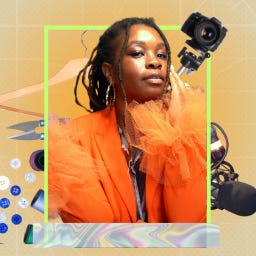Why I questioned my own book
I couldn't shake the feeling of "blah" around talking about something I'm actually passionate abut.
I created my style journal to help people reconnect with themselves—especially during moments of transition, reinvention, and becoming more visible in the world. At its core, it wasn’t just about clothes. It was about clarity.
But lately, I hadn’t felt excited about it.
Marketing it felt flat.
Talking about it felt forced.
And honestly? I started wondering if it even made sense to charge for it.
So what changed?
I processed it with ChatGPT.
Yeah, I know.
That may sound techy or impersonal if you’re someone who prefers journaling or talking it out with friends. But what I needed in that moment wasn’t more advice.
I needed mirroring.
I needed language.
I needed help unpacking what I already knew but couldn’t quite express.
What followed was one of the most clarifying and emotionally honest brand conversations I’ve had with myself in a long time.
Here’s Three Things That I Realized
1. I was looking at the wrong people.
I started thinking that most people already had a strong sense of style—especially the ones showing up all over my feed.
I forgot that the people who are struggling with style often aren’t the ones we see. They're the ones writing their content instead of filming it. The ones building brands quietly. The ones who don’t show up on camera, not because they’re lazy—but because they don’t feel ready to be seen.
“Those aren’t the people that need this. It’s the people who I don’t see or the people who I hear from, but don’t necessarily see their face.”
That hit me hard.
The very people this journal is for—are invisible by design. Until they’re not.
2. I needed to reconnect with why this matters.
I was stuck between knowing the journal had value, and wondering if anyone would pay for it.
And it wasn’t that I doubted the product. I was just discouraged.
Because I’d seen people use the free things I created and get real results—but skip over the paid offering.
“It does bother me that it is something that people will use for free, but it doesn’t seem like they’d be interested in paying for it.”
What I needed was to re-center the purpose of the journal.
Not the price.
Not the audience size.
But the person who’s holding back from the next level of their life because they don’t know how to dress for it.
3. Scenarios brought the spark back.
Instead of trying to "position" the product, I asked:
“What emotional state is someone in when they realize their style no longer fits?”
That question unlocked everything.
Together with ChatGPT, I mapped out scenario after scenario—not about fashion tips, but about the lives people are living when their clothes stop making sense.
Here are a few that hit the deepest:
The woman who left her job, her relationship, or an old version of herself—and is now standing in front of her closet wondering who she is now.
The expert who’s stepping into visibility but still dresses like she’s behind the scenes.
The woman who’s healing, softening, blooming—and wants her style to reflect that.
The ones who are always stylish, but never seen. The ones who are tired of performing. The ones who just want to feel honest again.
I remembered what this journal is really about:
Style isn’t the surface. It’s the reflection.
Where I'm going next
With this renewed clarity, I'm excited to experiment with content that truly speaks to these invisible-becoming-visible women. Here's what you'll see from me in the coming weeks:
• "Closet Confessions" – short stories of real women at turning points, and how their style evolved to match their transformation
• "Style Permission Slips" – playful prompts that give women permission to dress for who they're becoming, not just who they've been
• "The OOTD Style Challenge" – a 5-day mini experience to help people have fun with their closets again and rediscover creativity. This one is actually happening as I type this: April 7-11, 2025.
I'm choosing creativity and fun in how I share these ideas because transformation doesn't have to be heavy. Sometimes the biggest shifts happen
when we play.




